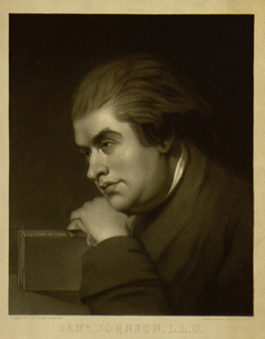
“Had Johnson left us nothing but his Dictionary, we might have traced there a great intellect, a genuine man.” —Thomas Carlyle (DeMaria, 1986)
Johnson’s definitions are full of traces of his literary and academic biases. “The sonnet,” for example, “is not very suitable to the English language,” according to Johnson. In his definition of “parenthesis,” he states definitively, “a sentence so included in another sentence, as that it may be taken out, without injuring the sense of that which incloses it.” Indeed, hardly more than a handful of brackets are to be found in all of Johnson’s own published writing. (Hitchings, 2005, p. 152). He asserts his high standards for scholarship in defining a “history” as “a narration of events and facts delivered with dignity.” Hitchings notes that “dignity” is not an intrinsic quality of histories; Johnson’s definition insinuates that it should be.
Elsewhere, Johnson offers surprisingly revealing moral judgments. “Suicide” is defined as “the horrid crime of destroying one’s self.” A stock trader, or “stockjobber,” is a “low wretch who gets money by buying and selling shares in the funds. “Gambler” is classified as “a knave whose practice it is to invite the unwary to game and cheat them.” A “pressgang” is “a crew that strolls about the streets to force men into naval service.” (Hitchings, 2005, p. 152) Johnson’s harsh treatment of married life in the dictionary is an obvious reflection of his perennially troubled relationship with his wife. He employs Francis Bacon to describe, “Thales being asked when a man should marry, said, young men not yet; old men, not at all.” Later, Bacon is quoted again in suggesting that “unmarried men are best friends, best masters, best servants, but not always best subjects, for they are light to run away.” Johnson cites Robert South as saying, “When a man thinks himself matched to one who should be a comfort to him, instead thereof he finds in his bosom a beast.” (Hitchings, 2005, p. 157)
Johnson’s political and religious sentiments have been of particular interest to biographers and scholars studying his Dictionary. His partisan allegiances are rather readily inferred by comparing his definition of “Whig” (“the name of a faction) with his definition of “Tory” (“one who adheres to the ancient constitution of the state, and the apostolical hierarchy of the Church of England, opposed to a Whig.”). One entry provided for “leader” reads: “One at the head of any party or faction: as the detestable Wharton was the leader of the Whigs.” While his contempt for Whig politics is obvious, Johnson’s Toryism little resembles contemporary conservative politics. He sympathized with progressive liberal causes including social welfare and the abolition of slavery. (Hitchings, 2005, p. 154). His religious affiliations are even less clandestine than his political leanings. A “Protestant” Johnson defines as “one of those who adhere to them, who, at the beginning of the reformation, protested against the errors of the church of Rome.” He is bitterly anti-Catholic; under “popery” Johnson quotes Swift, who explains that it is designed “for corruptions in doctrine and discipline…the most absurd system of Christianity.” (Hitchings, 2005, p. 155).
A Few Interesting and Humorous Definitions:
Distiller: One who makes and sells pernicious and inflammatory spirits.
Dull: Not exhilaterating (sic); not delightful; as, to make dictionaries is dull work.
Excise: A hateful tax levied upon commodities, and adjudged not by the common judges of property, but wretches hired by those to whom excise is paid.
Far-fetch: A deep stratagem. A ludicrous word.
Kickshaw: A dish so changed by the cookery that it can scarcely be known.
Oats: A grain, which in England is generally given to horses, but in Scotland appears to support the people.
Patron: One who countenances, supports or protects. Commonly a wretch who supports with insolence, and is paid with flattery.
Pension: An allowance made to any one without an equivalent. In England it is generally understood to mean pay given to a state hireling for treason to his country.
Navigate: Don't Judge A Book By Its Cover: An Introduction / The Early Life of Samuel Johnson / The Dictionary in a Sociocultural Context / Nine Years in the Making / The Dictionary Hits the Shelves: Critical and Public Reception / Traces of the Author and his Time / Conclusion: The Legacy of a Book / Bibliography
Politician: 1. One versed in the arts of government; one skilled in politicks. 2. A man of artifice; one of deep contrivance.
Navigate: Don't Judge A Book By Its Cover: An Introduction / The Early Life of Samuel Johnson / The Dictionary in a Sociocultural Context / Nine Years in the Making / The Dictionary Hits the Shelves: Critical and Public Reception / Traces of the Author and his Time / Conclusion: The Legacy of a Book / *Bibliography*
